- Home
- Daphne Du Maurier
The King's General Page 13
The King's General Read online
Page 13
He advanced into the room, letting the arras drop behind him, and I saw then that the man was my brother-in-law, Jonathan Rashleigh.
12
I felt like a child caught out in some misdemeanor, and was hot with shame and sick embarrassment. If he then was the stranger in the crimson cloak, walking his house in the small hours, it was not for me to question it. To be discovered thus, prying in his secrets, with the key not only of this door, but of his summerhouse as well, was surely something he could never pardon.
"Forgive me," I said. "I have acted very ill."
He did not answer at once, but first made certain that the door was closed. Then he lit further candles, and, laying aside his cloak, drew a chair up to the table.
"It was you," he said, "who made a crack there in the panel? It was not there before you came to Menabilly."
His blunt question showed me what a shrewd grasp he had of my gaping curiosity, and I confessed that I was indeed the culprit. "I will not attempt to defend myself," I said. "I know I had no right to tamper with your walls. There was some talk of ghosts, otherwise I would not have done it. And one night during last week I heard footsteps."
"Yes," he said. "I had not thought to find your chamber occupied. I heard you stir, and guessed then what had happened. We are somewhat pushed for room, as you no doubt realize, otherwise you would not have been put into the gatehouse."
He waited a moment, and then, looking closely at me, he said: "You have understood, then, that there is a secret entry to this chamber."
"Yes."
"And the reason you are here this evening is that you wished to find whither it led?"
"I knew it must be within the buttress."
"How did you come upon that key?"
This was the very devil, but there was nothing for it but to tell him the whole story, putting the blame heavily upon myself and saying little of Joan's share in the matter. I said that I had looked about the summerhouse, and admired the view, but as to my peering at his books, and his father's will and lifting the heavy mat and finding the flagstone--nay, he would have to put me on the rack before I confessed to that.
He listened in silence, regarding me coldly all the while, and I knew what an interfering fool he must consider me.
"And what do you make of it, now you know that the nightly intruder is none other than myself?" he questioned.
Here was a stumbling block. For I could make nothing of it. And I did not dare voice that secret very fearful supposition that I kept hidden at the back of my mind.
"I cannot tell, Jonathan," I answered, "except that you use this entry for some purpose of your own, and that your family know nothing of it." At this he was silent, considering me slowly, and then, after a long pause, he said to me: "John has some knowledge of the subject, but no one else, except my steward Langdon. Indeed, the success of the royal cause we have at heart would gravely suffer should the truth become known."
This last surprised me. I did not see that his family secrets could be of any concern to His Majesty. But I said nothing.
"Since you already know something of the truth," he said, "I will acquaint you further, desiring you first to keep all knowledge of it to yourself."
I promised, after a moment's hesitation, being uncertain what dire secret I might now be asked to share.
"You know," he said, "that at the beginning of hostilities I, with certain other gentlemen, was appointed by His Majesty's Council to collect and receive the plate given to the royal cause in Cornwall, and arrange for it to be taken to the Mint at Truro and there melted down?"
"I knew you were Collector, Jonathan--no more than that."
"Last year another Mint was erected at Exeter, under the supervision of my kinsman, Sir Richard Vyvyan, hence my constant business with that city. You will appreciate, Honor, that to receive a great quantity of very valuable plate, and be responsible for its safety until it reaches the Mint, is a heavy burden upon my shoulders."
"Yes, Jonathan."
"Spies abound, as you are well aware. Neighbors have long ears, and even a close friend can turn informer. If some member of the rebel army could but lay his hands upon the treasure that so frequently passes into my keeping, the Parliament would be ten times the richer, and His Majesty ten times the poorer. Therefore all cartage of the plate has to be done at night, when the roads are quiet. Also it is necessary to have depots throughout the county, where the plate can be stored until the necessary transport can be arranged. You have followed me so far?"
"Yes, Jonathan, and with interest."
"Very well, then. These depots must be secret. As few people as possible must know their whereabouts. It is therefore imperative that the houses or buildings that serve as depots should contain hiding places, known only to their owners. Menabilly, as you have already discovered, has such a hiding place."
I found myself getting hot under the skin, not at the implied sarcasm of his words, but because his revelation was so very different from what I--with excess of imagination--had supposed.
"The buttress against the far corner of this room," he continued, "is hollow in the center. A flight of narrow steps leads to a small room, built in the thickness of the wall and beneath the courtyard, where it is possible for a man to stand, and sit, though it is but five feet square. This room is connected with a passage, or rather tunnel, which runs under the house and so beneath the causeway to an outlet in the summerhouse. It is in this small buttress room that I have been accustomed, during the past year, to hide the plate. You understand me?"
I nodded, gripped by his story, and deeply interested.
"When the plate is brought to this depot, or taken away, we work by night, my steward, John Langdon, and I. The wagons wait down at Pridmouth, and we bring the plate from the buttress room, along the tunnel to the summerhouse, and so down to the cove in one of my handcarts, where it is placed in the wagons. The men who conduct the procession from here to Exeter are all trustworthy, but none of them, naturally, know whereabouts at Menabilly I have kept the plate hidden. That is not their business. No one knows that but myself and Langdon, and now you, Honor, who--I regret to say--have really no right at all to share the secret."
I said nothing, for there was no possible defense.
"John knows the plate has been concealed in the house, but has never inquired where. He is, as yet, ignorant of the room beneath the buttress, as well as the tunnel to the summerhouse."
Here I risked offence by interrupting him.
"It was providential," I said, "that Menabilly possessed so excellent a hiding place."
"Very providential," he agreed. "Had it not been so I could hardly have set about the business. You wonder, no doubt, why the house should have been so constructed?"
I confessed to some small wonder on the subject.
"My father," he said briefly, "had certain--how shall I put it?--shipping transactions, which necessitated privacy. The tunnel was therefore useful in many ways."
In other words, I said to myself, your father, dear Jonathan, was nothing more or less than a pirate of the first order, whatever his standing and reputation in Fowey and the county.
"It happened also," he said in a lower tone, "that my unfortunate eldest brother was not in full possession of his faculties. This was his chamber, from the time the house was built in 1600 until his death, poor fellow, twenty-four years later. At times he was violent, hence the reason for the little cell beneath the buttress, where lack of air and close confinement soon rendered him unconscious and easy then to handle."
He spoke naturally, and without restraint, but the picture that his words conjured up turned me sick. I saw the wretched, shivering maniac choking for air in the dark room beneath the buttress, with the four walls closing in upon him. And now this same room stacked with silver plate like a treasure-house in a fairy tale.
Jonathan must have seen my change of face, for he looked kindly at me and rose from his chair.
"I know," he said, "it is not a
pretty story. It was a relief to me, I must admit, when the smallpox that carried off my father took my brother too. It was not a happy business caring for him, with young children in the house. You have heard, no doubt, the malicious tales that Robert Bennett spread abroad?"
I mentioned vaguely that some rumor had come to my ears.
"He took the disease some five days after my father," said Jonathan. "Why he should have taken it, while my wife and I escaped, we shall never know. But so he did, and, becoming violent at the same time with one of his periodic fits, stood not a chance. It was over very quickly."
There were sounds of the servants moving from the kitchens.
"You will return now to your apartment," he said, "and I will go back the way I came. You may give me John Langdon's key. If in future you hear me come to this apartment, you will understand what I am about. I keep accounts here of the plate temporarily in my possession, which I refer to from time to time. I need hardly tell you that not a word of what has this night passed between us must be spoken about to any other person."
"I give you my solemn promise, Jonathan."
"Good night, then, Honor."
He helped me turn my chair into the passage, and then, very softly, closed the door behind me. I got to my own room a few moments before Matty came upstairs to draw the curtains.
13
Although there were never any ties of affection between me and my brother-in-law, I certainly held him in greater respect and regard after our encounter of that evening. I knew now that "the King's business" on which he traveled to and fro was no light matter, and it was small wonder he was often short tempered with his family. Men with less sense of duty would long since have shelved the responsibility onto other shoulders. I respected him too for having taken me into his confidence, after my unwarrantable intrusion into his locked chamber. I was left only with a sneaking regret that he had not shown me the staircase in the buttress or the cell beneath it, but this would have been too much to expect. I had a vivid picture, though, of the flapping arras and the black gulf behind. Meanwhile, the progress of the war was causing each one of us no small concern. Our western army was under the supreme command of the King's nephew, Prince Maurice, who was in great need of reinforcements, especially of cavalry, if he was ever to strike a decisive blow against the enemy. But the plan of the summer campaign appeared unsettled, and although Maurice's brother, Prince Rupert, endeavored to persuade the King to send some two thousand horse into the west there was the usual obstruction from the Council, and the cavalry were not forthcoming. This, of course, we heard from Richard, who, fuming with impatience because he had as yet none of the guns that had been promised him, told us with grim candor that our western army was anyhow worn with sickness, and quite useless, and that Prince Maurice himself had but one bee in his bonnet, which was to sit before Lyme Regis, waiting for the place to open up to him. "If Essex and the rebel army choose to march west," said Richard, "there is nothing to stop him, except a mob of sick men all lying on their backs, and a handful of drunken generals. I can do nothing, with my miserable two men and a boy squatting before Plymouth." Essex did choose to march west, and was in Weymouth and Bridport by the third week of June, and Prince Maurice, with great loss of prestige, retreated in haste to Exeter.
Here he found his aunt, the Queen, who had arrived in a litter from Bristol, being fearful of the approaching enemy, and it was here at Exeter that she gave birth to her youngest child, which did not lessen the responsibilities of Prince Maurice and his staff. He decided that the wisest course was to get her away to France as speedily as possible, and she set forth for Falmouth, very weak and nervous, two weeks after the baby had been born.
My brother-in-law Jonathan was among those who waited on her as she passed through Bodmin on her way south, and came back telling a very pitiful tale of her appearance, for she was much worn and shaken by her ordeal. "She may have advised His Majesty ill on many an occasion," said Jonathan, "but at least she is a woman, and I tremble to think of her fate if she fell into the hands of the rebels." It was a great relief to all the Royalists in Cornwall when she reached Falmouth without mishap, and embarked for France.
But Essex and the rebel army were gathering in numbers all the while, and we felt it was but a matter of weeks before he passed through Dorset into Devon, with nothing but the Tamar then between him and Cornwall. The only one who viewed the approaching struggle with relish was Richard. "If we can but draw the beggar into Cornwall," he said, "a county of which he knows nothing, and whose narrow lanes and high hedges would befog him completely, then, with the King's and Rupert's army coming up in the rear and cutting off all retreat, we will have him surrounded and destroyed."
I remember him rubbing his hands gleefully, and laughing at the prospect like a boy on holiday, but the idea did not much appeal to Jonathan and other gentlemen, who were dining at Menabilly on that day. "If we have fighting in Cornwall, the country will be devastated," said Francis Bassett, who with my brother-in-law was engaged at that time in trying to raise troops for the King's service, and finding it mighty hard. "The land is too poor to feed an army--we cannot do it. The fighting must be kept the other side of the Tamar, and we look to you and your troops, Grenvile, to engage the enemy in Devon and keep us from invasion."
"My good fool," said Richard--at which Francis Bassett colored, and we all felt uncomfortable--"you are a country squire, and I respect your knowledge of cattle and pigs. But for God's sake leave the art of war to professional soldiers like myself. Our aim at present is to destroy the enemy, which we cannot do in Devon, where there is no hope of encirclement. Once across the Tamar he will run his head into a noose. My only fear is that he will not do so, but will use his superior cavalry on the open Devon moors against Maurice and his hopeless team of half-wits, in which case we shall have lost one of the greatest chances this war has yet produced."
"You are prepared, then," said Jonathan, "to see Cornwall laid waste, people homeless, and much sickness and suffering spread abroad? It does not appear to be a prospect of much comfort."
"Damn your comfort," said Richard. "It will do my fellow countrymen a world of good to see a spot of bloodshed. If you cannot suffer that for the King's cause, then we may as well treat with the enemy forthwith."
There was some atmosphere of strain in the dining chamber when he had spoken, and shortly afterwards my brother-in-law gave the host's signal for dispersal. It was an oddity I could not explain even to myself that since Richard had come back into my life I could face company with greater equanimity than I had done before, and had now formed the habit of eating downstairs rather than in my chamber. Solitude was no longer my one aim. After dining, since it was still light, he took a turn with me upon the causeway, making himself attendant to my chair.
"If Essex draws near to Tavistock," he said, "and I am forced to raise the siege of Plymouth and retreat, can I send the whelp to you?"
I was puzzled for a moment, thinking he alluded to his dog.
"What whelp?" I asked. "I did not know you possessed one."
"The Southwest makes you slow of brain," he said. "My spawn, I mean--my pup, my son and heir. Will you have him here under your wing and put some sense into his frightened head?"
"Why, yes, indeed, if you think he would be happy with me."
"I think he would be happier with you than with any other person in the world. My aunt Abbot at Hartland is too old, and Bevil's wife at Stowe is so slung about with her own brood that I do not care to ask her. Besides, she has never thought much of me."
"Have you spoken to Jonathan?"
"Yes. He is willing. But I wonder what you will make of Dick. He is a scrubby object."
"I will love him, Richard, because he is your son."
"I doubt that sometimes when I look at him. He has a shrinking, timid way with him, and his tutor tells me that he cries for a finger scratch. I would exchange him any day for young Joe Grenvile, a kinsman, whom I have as aide-de-camp at Buckland. He is
up to any daring scheme, that lad, and a fellow after my own heart, like Bevil's eldest boy."
"Dick is barely turned fourteen," I said to him. "You must not expect too much. Give him a year or two to learn confidence."
"If he has taken after his mother, then I'll turn him off and let him starve," said Richard. "I won't have frog's spawn about me."
"Perhaps," I said, "your example does not greatly encourage him to take after yourself. Were I a child I would not want a red fox for a father."
"He is the wrong age for me," said Richard: "too big to dandle, and too small to talk to. He is yours, Honor, from this day forward. I declare I will bring him over to you this day week."
And so it was arranged, with Jonathan's permission, that Dick Grenvile, and his tutor, Herbert Ashley, should add to the numbers at Menabilly. I was strangely happy and excited the day they were expected, and went with my sister Mary to inspect the room that had been put to their service beneath the clock tower.
I took pains with my toilet, wearing my blue gown that was my favorite, and bidding Matty brush my hair for half the morning. And all the while I told myself what a sentimental fool I was to waste such time and trouble for a little lad who would not look at me. It was about one o'clock that I heard the horses trotting across the park, and I called in a fever to Matty to fetch the servants to carry me downstairs, for I wished to be in the garden when I greeted them, for I have a firm belief that it is always easier to become acquainted with anyone out of doors, in the sun, than shut fast within four walls.
I was seated, then, in the walled garden beneath the causeway, when the gate opened and a lad came walking across the lawn towards me. He was taller than I had imagined, with the flaming Grenvile locks, and an impudent snub nose, and a swagger about him that reminded me instantly of Richard. And then, as he spoke, I realized my mistake. "My name is Joe Grenvile," he said. "They have sent me from the house to bring you back. There has been a slight mishap. Poor Dick tumbled from his horse as we drew rein in the courtyard--the stones were somewhat slippery--and he has cut his head. They have taken him to your chamber, and your maid is washing off the blood."

 Jamaica Inn
Jamaica Inn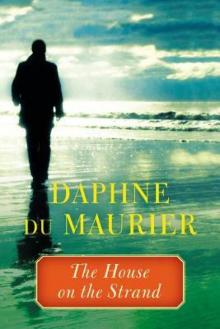 The House on the Strand
The House on the Strand I'll Never Be Young Again
I'll Never Be Young Again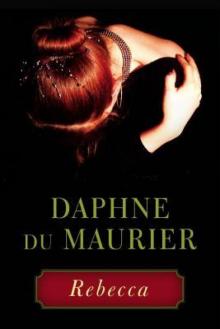 Rebecca
Rebecca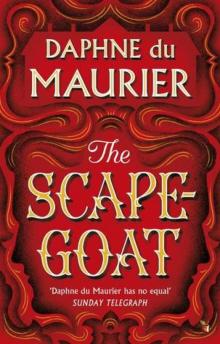 The Scapegoat
The Scapegoat The Birds and Other Stories
The Birds and Other Stories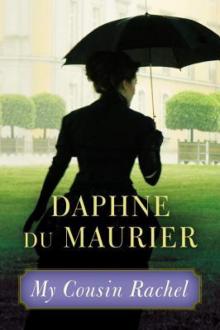 My Cousin Rachel
My Cousin Rachel Don't Look Now
Don't Look Now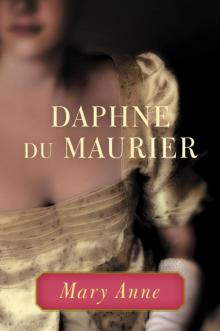 Mary Anne
Mary Anne Hungry Hill
Hungry Hill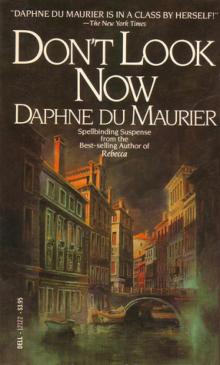 Don't Look Now and Other Stories
Don't Look Now and Other Stories The Loving Spirit
The Loving Spirit Rule Britannia
Rule Britannia The King's General
The King's General The Breaking Point: Short Stories
The Breaking Point: Short Stories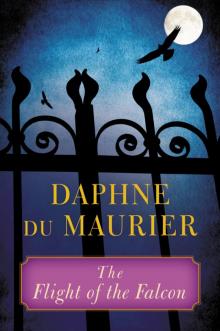 The Flight of the Falcon
The Flight of the Falcon The Apple Tree: a short novel & several long stories
The Apple Tree: a short novel & several long stories The Breaking Point
The Breaking Point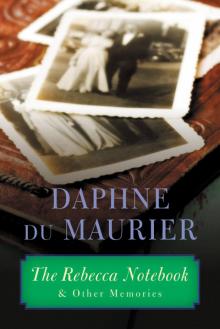 The Rebecca Notebook
The Rebecca Notebook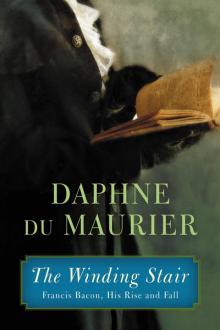 The Winding Stair: Francis Bacon, His Rise and Fall
The Winding Stair: Francis Bacon, His Rise and Fall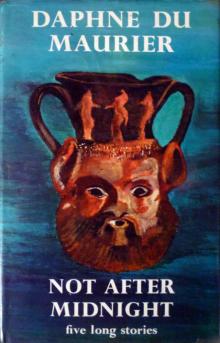 Not After Midnight & Other Stories
Not After Midnight & Other Stories The Doll
The Doll The Apple Tree
The Apple Tree